|
STATES |
DETAILS/RESULTS/ACTIONS |
|
A1: A/C COMPRESSOR CLUTCH OPERATION CHECK |
|
|
1 Drive the START position. |
|
|
2 Turn on the air conditioning system. |
|
|
3 Turn on the heater fan. |
|
|
4 Check the operation of the air conditioning compressor clutch. |
|
|
• Is the air conditioning compressor clutch working? |
|
|
→ Yes |
|
|
CHECK the refrigerant circuit and the amount of refrigerant and CORRECT if necessary. CHECK the system is working properly. |
|
|
→ No |
|
|
Go to A2 |
|
|
A2: READING FDS/WDS TROUBLE CODES |
|
|
1 Enter the OFF position. |
|
|
2 Run the engine control system diagnostic program to retrieve trouble codes using FDS/WDS. |
|
|
• Is there a fault code related to the air conditioning system? |
|
|
→ Yes |
|
|
PERFORM the necessary troubleshooting steps as instructed by FDS/WDS. CHECK the system is working properly. |
|
|
→ No |
|
|
Go to A3 |
|
|
A3: CHECK FUSE F58 |
|
|
1 CHECK Fuse F58 (CJB). |
|
|
• Is the fuse good? |
|
|
→ Yes |
|
|
Go to A4 |
|
|
→ No |
|
|
REPLACE fuse F58 (7,5 A). If the fuse blows again after turning on the air conditioning system, INSPECT the air conditioning compressor clutch diode and REPLACE it if necessary. If the diode is OK, LOCATE and REPAIR the short to ground using the wiring diagrams. CHECK the system is working properly. |
|
|
A4: FUSE VOLTAGE CHECK F58 |
|
|
1 Connect Fuse F58 (CJB). |
|
|
2 Drive the ON position. |
|
|
3 Check the voltage in the electrical circuit between fuse F58 (7.5 A) And "weight". |
|
|
• Is battery voltage being recorded? |
|
|
→ Yes |
|
|
Go to A5 |
|
|
→ No |
|
|
RESTORE power to fuse F58 using the wiring diagrams. CHECK the system is working properly. |
|
|
A5: FUSE CHECK F36 |
|
|
1 Enter the OFF position. |
|
|
2 CHECK Fuse F36 (CJB). |
|
|
• Is the fuse good? |
|
|
→ Yes |
|
|
Go to A6 |
|
|
→ No |
|
|
REPLACE fuse F36 (7,5 A). If the fuse blows again, LOCATE and REPAIR the short to ground using the wiring diagrams. CHECK the system is working properly. |
|
|
A6: FUSE VOLTAGE CHECK F36 |
|
|
1 Connect Fuse F36 (CJB). |
|
|
2 Check the voltage in the electrical circuit between fuse F36 (7.5 A) And "weight". |
|
|
• Is battery voltage being recorded? |
|
|
→ Yes |
|
|
Vehicles built before 05.99: Go to A7 |
|
|
Vehicles built since 05.99: Go to A10 |
|
|
→ No |
|
|
RESTORE power to fuse F36 using the wiring diagrams. CHECK the system is working properly. |
|
|
A7: CHECK THE VOLTAGE OF THE A/C SHUT OFF RELAY WITH THE THROTTLE WIDE OPEN (WOT) |
|
|
1 Disconnect the C1011 A/C WOT relay. |
|
|
2 Drive the ON position. |
|
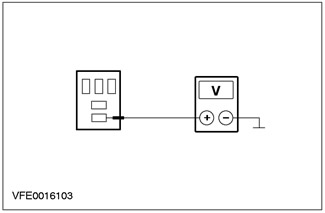
|
3 Measure the voltage between A/C WOT relay connector C1011 pin 3, harness side, and ground. |
|
• Is battery voltage being recorded? |
|
|
→ Yes |
|
|
Go to A11 |
|
|
→ No |
|
|
Go to A8 |
|
|
A8: CHECKING THE SUPPLY VOLTAGE IN THE DOUBLE PRESSURE SWITCH |
|
|
1 Enter the OFF position. |
|
|
2 Disconnect the C882 dual pressure switch. |
|
|
3 Drive the ON position. |
|
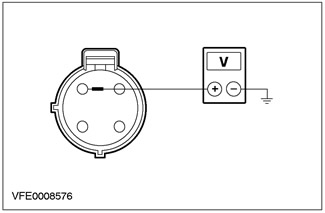
|
4 Measure voltage between pin 2 of connector C882 of dual pressure switch circuit 15-FA38 (green-red), from the wiring harness side, and ground. |
|
• Is battery voltage being recorded? |
|
|
→ Yes |
|
|
Go to A9 |
|
|
→ No |
|
|
LOCATE and REPAIR the open circuit between fuse F58 and dual pressure switch using the wiring diagrams. CHECK the system is working properly. |
|
|
A9: CHECKING THE DUAL PRESSURE SWITCH |
|
|
1 Enter the OFF position. |
|
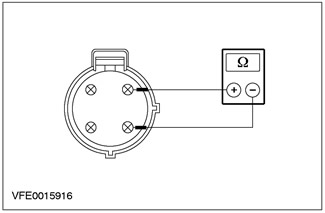
|
2 Measure the resistance between pins 2 and 4 of connector C882 on the dual pressure switch, element side. |
|
• Is less than 2 ohms registered? |
|
|
→ Yes |
|
|
LOCATE and REPAIR the open circuit between the dual pressure switch and the A/C WOT switch using the wiring diagrams. CHECK the system is working properly. |
|
|
→ No |
|
|
CHECK air conditioning system pressure and MAKE necessary REPAIR. If system pressure is correct, REPLACE dual pressure switch. CHECK the system is working properly. |
|
|
A10: A/C SHUT OFF RELAY VOLTAGE CHECK WITH THROTTLE WIDE OPEN (WOT) |
|
|
1 Disconnect the C1011 A/C WOT relay. |
|
|
2 Drive the ON position. |
|
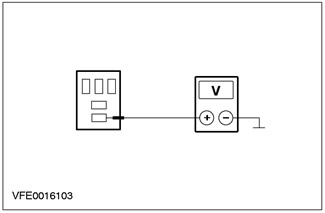
|
3 Measure the voltage between A/C WOT relay connector C1011 pin 3, harness side, and ground. |
|
• Is battery voltage being recorded? |
|
|
→ Yes |
|
|
Go to A11 |
|
|
→ No |
|
|
LOCATE and REPAIR the open circuit between the A/C WOT relay and fuse F58 using the wiring diagrams. CHECK the system is working properly. |
|
|
A11: CHECK THE SUPPLY VOLTAGE TO A/C WOT RELAY |
|
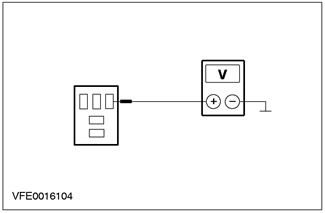
|
1 Measure voltage between pin 1 of connector C1011 of A/C WOT relay, circuit 15-FA11 (green-yellow), from the wiring harness side, and ground. |
|
• Is battery voltage being recorded? |
|
|
→ Yes |
|
|
Go to A12 |
|
|
→ No |
|
|
RESTORE voltage to the A/C WOT relay using the wiring diagrams. CHECK the system is working properly. |
|
|
A12: A/C COMPRESSOR CLUTCH CIRCUIT CHECK |
|
|
1 Enter the OFF position. |
|
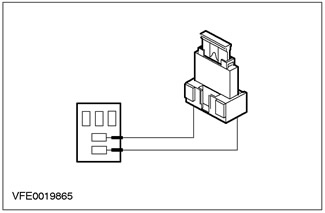
|
2 Install fuse connection cable (7.5 A) between pins 3 and 5 of connector C1011 of A/C WOT relay, harness side. |
|
3 Drive the ON position. |
|
|
4 Check the operation of the air conditioning compressor clutch. |
|
|
• Is the air conditioning compressor clutch working? |
|
|
→ Yes |
|
|
Go to A15 |
|
|
→ No |
|
|
Go to A13 |
|
|
A13: A/C COMPRESSOR CLUTCH SUPPLY VOLTAGE CHECK |
|
|
1 Enter the OFF position. |
|
|
2 Disconnect the C952 A/C compressor clutch. |
|
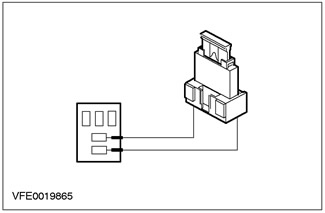
|
3 Install fuse connection cable (7.5 A) between pins 3 and 5 of connector C1011 of A/C WOT relay, harness side. |
|
4 Drive the ON position. |
|
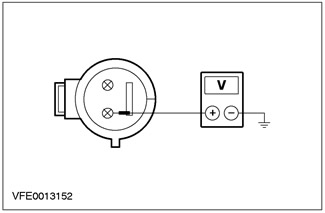
|
5 Measure voltage between pin 1 of connector C952 of A/C compressor clutch, circuit 15S-FA6 (green-yellow), from the wiring harness side, and ground. |
|
• Is battery voltage being recorded? |
|
|
→ Yes |
|
|
Go to A14 |
|
|
→ No |
|
|
LOCATE and REPAIR the open circuit between the A/C WOT relay and the air conditioning compressor clutch using the wiring diagrams. CHECK the system is working properly. |
|
|
A14: A/C COMPRESSOR CLUTCH GROUND ELECTRICAL CHECK |
|
|
1 Enter the OFF position. |
|
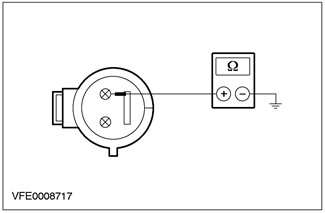
|
2 Measure the resistance between pin 2 of connector C952, air conditioning compressor clutch, circuit 31-FA6 (black), from the wiring harness side, and ground. |
|
• Is less than 2 ohms registered? |
|
|
→ Yes |
|
|
REPLACE air conditioning compressor clutch. CHECK the system is working properly. |
|
|
→ No |
|
|
LOCATE and REPAIR the open circuit between the A/C compressor clutch and ground point G56 using the wiring diagrams. CHECK the system is working properly. |
|
|
A15: THROTTLE WIDE OPEN A/C SHUT RELAY TEST (WOT) |
|
|
1 Test the A/C WOT relay following the item tests described at the end of this section. |
|
|
• A/C WOT relay OK? |
|
|
→ Yes |
|
|
Go to A16 |
|
|
→ No |
|
|
REPLACE A/C WOT relay. CHECK the system is working properly. |
|
|
A16: CHECK THE POWER SUPPLY TO THE A/C COMPRESSOR SWITCH |
|
|
1 Enter the OFF position. |
|
|
2 Disconnect the C692 air conditioning compressor switch. |
|
|
3 Drive the ON position. |
|
|
4 Turn on the air conditioning system. |
|
|
5 Turn on the heater fan. |
|
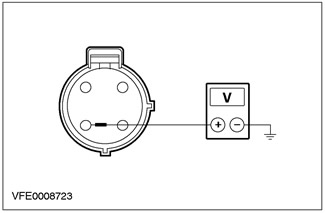
|
6 Measure the voltage between pin 4 of connector C692 of the air conditioning compressor switch circuit 15S-FA17 (green-orange), from the wiring harness side, and ground. |
|
• Is battery voltage being recorded? |
|
|
→ Yes |
|
|
Go to A17 |
|
|
→ No |
|
|
Go to A24 |
|
|
A17: A/C SYSTEM COMPRESSOR SWITCH CHECK |
|
|
1 Enter the OFF position. |
|
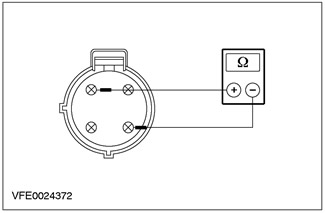
|
2 Measure the resistance between pins 4 and 1 of connector C692 of the air conditioning compressor cycling switch, element side. |
|
• Is less than 2 ohms registered? |
|
|
→ Yes |
|
|
Vehicles manufactured before 05.99 with EEC V (60-pin): Move to A20 |
|
|
Vehicles manufactured before 05.99 with EEC V (104-pin): Go to A22 |
|
|
Vehicles built since 05.99 Go to A18 |
|
|
→ No |
|
|
CHECK the amount of refrigerant and, if necessary, CORRECT it. If the amount of refrigerant is correct, REPLACE the air conditioning compressor cycling switch. CHECK the system is working properly. |
|
|
A18: CHECKING THE POWER SUPPLY TO THE DUAL PRESSURE SWITCH |
|
|
1 Connect the C692 air conditioning compressor switch. |
|
|
2 Disconnect Dual Pressure Switch C882. |
|
|
3 Drive the ON position. |
|
|
4 Turn on the air conditioning system. |
|
|
5 Turn on the heater fan. |
|
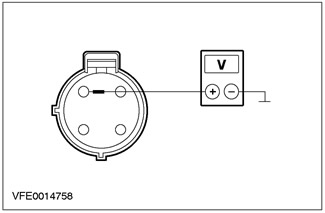
|
6 Measure voltage between pin 2 of connector C882 of dual pressure switch circuit 15S-FA38 (green-red), from the wiring harness side, and ground. |
|
• Is battery voltage being recorded? |
|
|
→ Yes |
|
|
Go to A19 |
|
|
→ No |
|
|
LOCATE and REPAIR the open in circuit C between the A/C compressor switch and the dual pressure switch using the wiring diagrams. CHECK the system is working properly. |
|
|
A19: CHECKING THE DUAL PRESSURE SWITCH |
|
|
1 Enter the OFF position. |
|
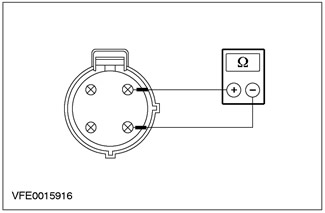
|
2 Measure the resistance between pins 2 and 4 of connector C882 on the dual pressure switch, element side. |
|
• Is less than 2 ohms registered? |
|
|
→ Yes |
|
|
Vehicles with EEC V (60-pin): Move to A20 |
|
|
Vehicles with EEC V (104-pin): Go to A22 |
|
|
→ No |
|
|
CHECK air conditioning system pressure and MAKE necessary REPAIR. If system pressure is correct, REPLACE dual pressure switch. CHECK the system is working properly. |
|
|
A20: VOLTAGE CHECK IN PCM |
|
|
1 Connect the C882 dual pressure switch. |
|
|
2 Disconnect the C416 PCM. |
|
|
3 Drive the ON position. |
|
|
4 Turn on the air conditioning system. |
|
|
5 Turn on the heater fan. |
|
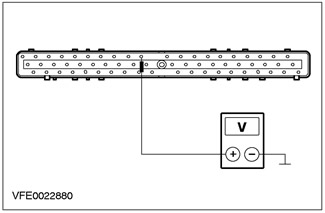
|
6 Measure the voltage between pin 10 of connector C416 PCM, circuit 15S-RE18 (green-yellow), (vehicles manufactured since 05.99): electric circuit 15S-RE8 (green-yellow), from the wiring harness side, and ground. |
|
• Is battery voltage being recorded? |
|
|
→ Yes |
|
|
Go to A21 |
|
|
→ No |
|
|
LOCATE and REPAIR open circuit 15S-RE18 (green-yellow) or 15S-RE8 (green-yellow), using wiring diagrams. CHECK the system is working properly. |
|
|
A21: VOLTAGE CHECK IN PCM |
|
|
1 Enter the OFF position. |
|
|
2 Connect C1011 A/C WOT relay. |
|
|
3 Drive the ON position. |
|

|
4 Measure the voltage between pin 54 of connector C416 PCM, circuit 31S-FA11 (black and yellow), from the wiring harness side, and ground. |
|
• Is battery voltage being recorded? |
|
|
→ Yes |
|
|
CHECK PCM and REPLACE if necessary. CHECK the system is working properly. |
|
|
→ No |
|
|
LOCATE and REPAIR the open circuit between the A/C WOT relay and the PCM using the wiring diagrams. CHECK the system is working properly. |
|
|
A22: VOLTAGE CHECK IN PCM |
|
|
1 Connect the C882 dual pressure switch. |
|
|
2 Disconnect the C415 PCM. |
|
|
3 Drive the ON position. |
|
|
4 Turn on the air conditioning system. |
|
|
5 Turn on the heater fan. |
|
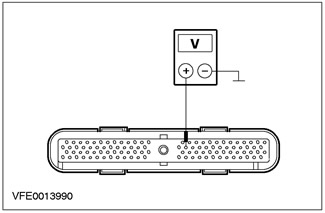
|
6 Measure the voltage between pin 41 of connector C415 PCM, circuit 15S-RE18 (green-yellow), (vehicles manufactured since 05.99): electric circuit 15S-RE8 (green-yellow), from the wiring harness side, and ground. |
|
• Is battery voltage being recorded? |
|
|
→ Yes |
|
|
Go to A23 |
|
|
→ No |
|
|
LOCATE and REPAIR open circuit 15S-RE18 (green-yellow) or 15S-RE8 (green-yellow), using wiring diagrams. CHECK the system is working properly. |
|
|
A23: VOLTAGE CHECK IN PCM |
|
|
1 Enter the OFF position. |
|
|
2 Connect C1011 A/C WOT relay. |
|
|
3 Drive the ON position. |
|
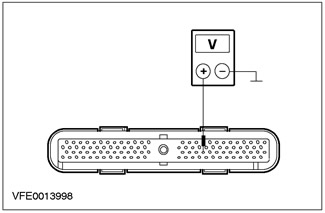
|
4 Measure the voltage between pin 69 of connector C415 PCM, circuit 31S-FA11 (black and yellow), from the wiring harness side, and ground. |
|
• Is battery voltage being recorded? |
|
|
→ Yes |
|
|
CHECK PCM and REPLACE if necessary. CHECK the system is working properly. |
|
|
→ No |
|
|
LOCATE and REPAIR the open circuit between the A/C WOT relay and the PCM using the wiring diagrams. CHECK the system is working properly. |
|
|
A24: CHECKING THE ELECTRICAL CIRCUIT BETWEEN THE HEATER CONTROL MODULE AND THE A/C COMPRESSOR SWITCH |
|
|
1 Enter the OFF position. |
|
|
2 Disconnect the C380 heater control module. |
|

|
3 Measure the resistance between pin 9 of connector C380 of the heater control module, circuit 15S-FA17 (green-orange), on the wiring harness side, and pin 4 of connector C692 of the A/C compressor switch, circuit 15S-FA17 (green-orange), from the wiring harness side. |
|
• Is less than 2 ohms registered? |
|
|
→ Yes |
|
|
Go to A25 |
|
|
→ No |
|
|
LOCATE and REPAIR open circuit 15S-FA17 (green-orange) between the heater control module and the A/C compressor switch using the wiring diagrams. CHECK the system is working properly. |
|
|
A25: VOLTAGE CHECK IN THE HEATER CONTROL MODULE |
|
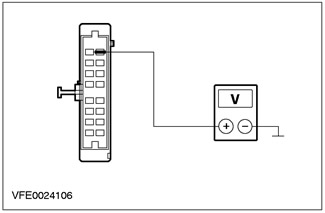
|
1 Measure the voltage between pin 8 of connector C380 of the heater control module, circuit 29-FA13 (orange), from the wiring harness side, and ground. |
|
• Is battery voltage being recorded? |
|
|
→ Yes |
|
|
Go to A26 |
|
|
→ No |
|
|
LOCATE and REPAIR open circuit between fuse F36 and heater control module using the wiring diagrams. CHECK the system is working properly. |
|
|
A26: VOLTAGE CHECK IN THE HEATER CONTROL MODULE |
|
|
1 Drive the ON position. |
|
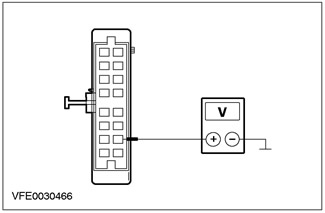
|
2 Measure the voltage between heater control module connector C380 pin 10 and ground. |
|
• Is battery voltage being recorded? |
|
|
→ Yes |
|
|
Go to A27 |
|
|
→ No |
|
|
LOCATE and REPAIR the open circuit between the heater control module and fuse F58 using the wiring diagrams. CHECK the system is working properly. |
|
|
A27: VOLTAGE CHECK IN THE HEATER CONTROL MODULE |
|
|
1 Drive the START position. |
|
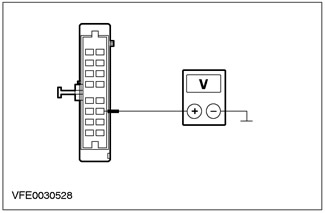
|
2 Measure the voltage between heater control module connector C380 pin 11, harness side, and ground. |
|
• Is battery voltage being recorded? |
|
|
→ Yes |
|
|
Go to A28 |
|
|
→ No |
|
|
LOCATE and REPAIR the open circuit between the heater control module and the engine run relay using the wiring diagrams. CHECK the system is working properly. |
|
|
A28: CHECK THE GROUND CIRCUIT OF THE HEATER CONTROL MODULE |
|
|
1 Enter the OFF position. |
|
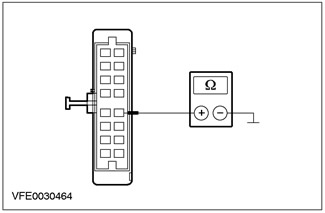
|
2 Measure the resistance between pin 12 of connector C380 of the heater control module, circuit 91-FA13 (black-orange), from the wiring harness side, and ground. |
|
• Is less than 2 ohms registered? |
|
|
→ Yes |
|
|
Go to A29 |
|
|
→ No |
|
|
LOCATE and REPAIR the open circuit between the heater control module and ground point G41 using the wiring diagrams. CHECK the system is working properly. |
|
|
A29: CHECK THE ELECTRICAL CIRCUIT BETWEEN HEATER CONTROL MODULE AND HEATER FAN SWITCH |
|
|
1 Set the heater fan switch to low speed. |
|
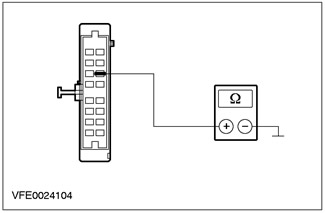
|
2 Measure the resistance between pin 6 of connector C380 of the heater control module, circuit 31S-FA26 (black and red), from the wiring harness side, and ground. |
|
• Is less than 2 ohms registered? |
|
|
→ Yes |
|
|
CHECK and if necessary REPLACE the heater control module. CHECK the system is working properly. |
|
|
→ No |
|
|
LOCATE and REPAIR open circuit 31S-FA26 (black and red) between the heater control module and the heater fan switch using the wiring diagrams. CHECK the system is working properly. |
|
PINPOINT TEST B: HEATER ELECTRIC FAN, PARTIALLY/FULLY NOT WORKING
|
STATES |
DETAILS/RESULTS/ACTIONS |
|
B1: DEFINING THE CONDITIONS UNDER WHICH A FAULT OCCUR |
|
|
1 Drive the ON position. |
|
|
2 Toggle the heater fan switch through all three positions. |
|
|
• Does the heater blower motor not run in all three switch positions? |
|
|
→ Yes |
|
|
Navigate to B2 |
|
|
→ No |
|
|
Go to B10 |
|
|
B2: CHECKING THE FUSE F64 |
|
|
1 Enter the OFF position. |
|
|
2 CHECK Fuse F64 (BJB). |
|
|
• Is the fuse good? |
|
|
→ Yes |
|
|
Go to B3 |
|
|
→ No |
|
|
REPLACE fuse F64 (30 A). CHECK the system is working properly. If the fuse blows again, LOCATE and REPAIR the short to ground using the wiring diagrams. |
|
|
B3: FUSE VOLTAGE CHECK F64 |
|
|
1 Connect F64 fuse (BJB). |
|
|
2 Drive the ON position. |
|
|
3 Check the voltage in the circuit between fuse F64 (30 A) And "weight". |
|
|
• Is battery voltage being recorded? |
|
|
→ Yes |
|
|
Go to B4 |
|
|
→ No |
|
|
RESTORE power to fuse F64 using the wiring diagrams. CHECK the system is working properly. |
|
|
B4: VOLTAGE CHECK IN HEATER FAN MOTOR |
|
|
1 Enter the OFF position. |
|
|
2 Disconnect the heater fan motor C789. |
|
|
3 Drive the ON position. |
|
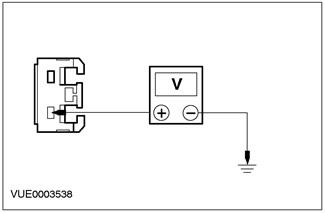
|
4 Measure the voltage between pin 1 of connector C789, heater fan circuit 15-FA18 (green-orange), from the wiring harness side, and ground. |
|
• Is battery voltage being recorded? |
|
|
→ Yes |
|
|
Go to B5 |
|
|
→ No |
|
|
LOCATE and REPAIR the open circuit between the heater fan motor and fuse F64 using the wiring diagrams. CHECK the system is working properly. |
|
|
B5: HEATER ELECTRIC FAN GROUND CIRCUIT CHECK |
|
|
1 Enter the OFF position. |
|
|
2 Set the heater fan switch to "maximum". |
|
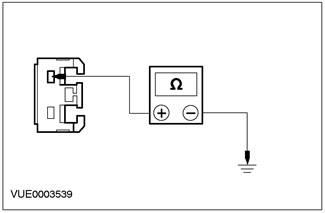
|
3 Measure the resistance between pin 2 of connector C789, heater fan, circuit 31S-FA18 (black and red), from the wiring harness side, and ground. |
|
• Is less than 2 ohms registered? |
|
|
→ Yes |
|
|
REPLACE heater fan. CHECK the system is working properly. |
|
|
→ No |
|
|
Vehicles built before 01.00: Go to B6 |
|
|
Vehicles built after 01.00: Go to B8 |
|
|
B6: CHECK THE ELECTRICAL CIRCUIT BETWEEN THE HEATER ELECTRIC FAN AND THE HEATER FAN SWITCH |
|
|
1 Disconnect the C469 heater blower switch. |
|
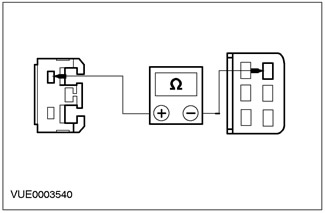
|
2 Measure the resistance between pin 2 of connector C789, heater fan, circuit 31S-FA18 (black and red), on the wiring harness side, and pin 4 of connector C469 of the heater fan switch, circuit 31S-FA33 (black-orange), from the wiring harness side. |
|
• Is less than 2 ohms registered? |
|
|
→ Yes |
|
|
Go to B7 |
|
|
→ No |
|
|
LOCATE and REPAIR open circuit 31S-FA18 (black and red) between heater fan and solder joint S24 using the wiring diagrams. CHECK the system is working properly. |
|
|
B7: HEATER FAN SWITCH GROUND ELECTRICAL CHECK |
|
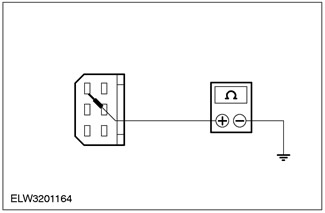
|
1 Measure the resistance between pin 6 of connector C469, heater blower switch, circuit 31-FA25 (black), from the wiring harness side, and ground. |
|
• Is less than 2 ohms registered? |
|
|
→ Yes |
|
|
REPLACE heater blower switch. CHECK the system is working properly. |
|
|
→ No |
|
|
LOCATE and REPAIR the open circuit between the heater blower switch and G14 ground using the wiring diagrams. CHECK the system is working properly. |
|
|
B8: CHECKING THE ELECTRICAL CIRCUIT BETWEEN THE HEATER ELECTRIC FAN AND THE HEATER FAN SWITCH |
|
|
1 Disconnect the C469 heater blower switch. |
|
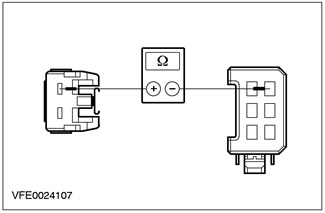
|
2 Measure the resistance between pin 2 of connector C789, heater fan, circuit 31S-FA18 (black and red), on the wiring harness side, and pin 6 of connector C469 of the heater blower switch, circuit 31S-FA33 (black-orange), from the wiring harness side. |
|
• Is less than 2 ohms registered? |
|
|
→ Yes |
|
|
Go to B9 |
|
|
→ No |
|
|
LOCATE and REPAIR open circuit 31S-FA18 (black and red) between heater fan and solder joint S24 using the wiring diagrams. CHECK the system is working properly. |
|
|
B9: HEATER FAN SWITCH GROUND ELECTRICAL CHECK |
|
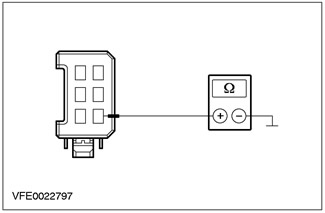
|
1 Measure the resistance between pin 2 of connector C469, heater fan switch, circuit 31-FA25 (black), from the wiring harness side, and ground. |
|
• Is less than 2 ohms registered? |
|
|
→ Yes |
|
|
REPLACE heater blower switch. CHECK the system is working properly. |
|
|
→ No |
|
|
LOCATE and REPAIR the open circuit between the heater blower switch and G14 ground using the wiring diagrams. CHECK the system is working properly. |
|
|
B10: DEFINING THE CONDITIONS UNDER WHICH A FAULT OCCUR |
|
|
1 Set the heater fan switch to "maximum". |
|
|
• Heater blower motor not working? |
|
|
→ Yes |
|
|
Vehicles built before 01.00: Go to B11 |
|
|
Vehicles built after 01.00: Go to B12 |
|
|
→ No |
|
|
Vehicles built before 01.00: Go to B13 |
|
|
Vehicles built after 01.00: Go to B18 |
|
|
B11: CHECKING THE ELECTRICAL CIRCUIT BETWEEN THE HEATER ELECTRIC FAN AND THE HEATER FAN SWITCH |
|
|
1 Enter the OFF position. |
|
|
2 Disconnect the C469 heater blower switch. |
|
|
3 Disconnect the heater fan motor C789. |
|
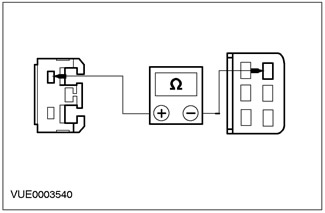
|
4 Measure the resistance between pin 2 of connector C789, heater fan, circuit 31S-FA18 (black and red), on the wiring harness side, and pin 4 of connector C469 of the heater fan switch, circuit 31S-FA33 (black-orange), from the wiring harness side. |
|
• Is less than 2 ohms registered? |
|
|
→ Yes |
|
|
REPLACE heater blower switch. CHECK the system is working properly. |
|
|
→ No |
|
|
LOCATE and REPAIR open circuit 31S-FA33 (black-orange) between the heater blower switch and solder joint S24, using the wiring diagrams. CHECK the system is working properly. |
|
|
B12: CHECKING THE ELECTRICAL CIRCUIT BETWEEN THE HEATER ELECTRIC FAN AND THE HEATER FAN SWITCH |
|
|
1 Enter the OFF position. |
|
|
2 Disconnect the C469 heater blower switch. |
|
|
3 Disconnect the heater fan motor C789. |
|
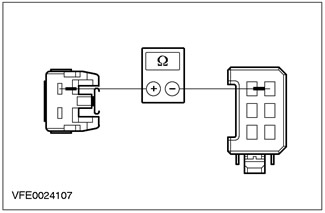
|
4 Measure the resistance between pin 2 of connector C789, heater fan, circuit 31S-FA18 (black and red), on the wiring harness side, and pin 6 of connector C469 of the heater blower switch, circuit 31S-FA33 (black-orange), from the wiring harness side. |
|
• Is less than 2 ohms registered? |
|
|
→ Yes |
|
|
REPLACE heater blower switch. CHECK the system is working properly. |
|
|
→ No |
|
|
LOCATE and REPAIR open circuit 31S-FA33 (black-orange) between the heater blower switch and solder joint S24, using the wiring diagrams. CHECK the system is working properly. |
|
|
B13: HEATER FAN SWITCH CHECK |
|
|
1 Enter the OFF position. |
|
|
2 Disconnect the C469 heater blower switch. |
|
|
3 Drive the ON position. |
|
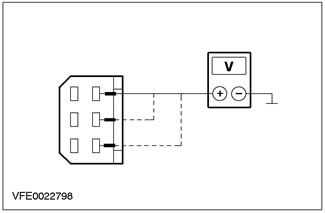
|
4 Measure the voltage between pin 1 of connector C469, heater blower switch, circuit 31S-FA32 (black and blue), from the wiring harness side, and ground. |
|
5 Measure the voltage between pin 2 of connector C469, heater fan switch, circuit 31S-FA31 (black and yellow), from the wiring harness side, and ground. |
|
|
6 Measure the voltage between pin 3 of connector C469, heater blower switch, circuit 31S-FA30 (black and white), from the wiring harness side, and ground. |
|
|
• Is battery voltage recorded for all measurements? |
|
|
→ Yes |
|
|
REPLACE heater blower switch. CHECK the system is working properly. |
|
|
→ No |
|
|
Go to B14 |
|
|
B14: CHECK THE ELECTRICAL CIRCUIT BETWEEN THE HEATER FAN MOTOR AND THE HEATER FAN VARIABLE RESISTOR. |
|
|
1 Enter the OFF position. |
|
|
2 Disconnect the heater fan variable resistor C470. |
|
|
3 Drive the ON position. |
|
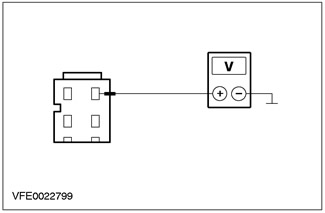
|
4 Measure the voltage between pin 1 of connector C470 of the heater fan variable resistor, circuit 31S-FA1 (black and blue), from the wiring harness side, and ground. |
|
• Is battery voltage being recorded? |
|
|
→ Yes |
|
|
Go to B15 |
|
|
→ No |
|
|
LOCATE and REPAIR open circuit 31S-FA1 (black and blue) between heater fan variable resistor and solder joint S24 using the wiring diagrams. CHECK the system is working properly. |
|
|
B15: INSPECT ELECTRICAL CIRCUIT BETWEEN HEATER FAN VARIABLE RESISTOR AND HEATER FAN SWITCH |
|
|
1 Enter the OFF position. |
|
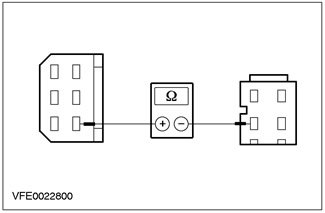
|
2 Measure the resistance between pin 4 of connector C470 of the heater fan variable resistor, circuit 31S-FA32 (black and blue), on the wiring harness side, and pin 1 of connector C469, heater blower switch, circuit 31S-FA32 (black and blue), from the wiring harness side. |
|
• Is less than 2 ohms registered? |
|
|
→ Yes |
|
|
Go to B16 |
|
|
→ No |
|
|
LOCATE and REPAIR open circuit 31S-FA32 (black and blue) between the heater fan motor variable resistor and the heater fan switch, using the wiring diagrams. CHECK the system is working properly. |
|
|
B16: INSPECT ELECTRICAL CIRCUIT BETWEEN HEATER FAN VARIABLE RESISTOR AND HEATER FAN SWITCH |
|

|
1 Measure the resistance between pin 2 of connector C470 of the heater fan variable resistor, circuit 31S-FA31 (black and yellow), on the wiring harness side, and pin 2 of connector C469 of the heater fan switch, circuit 31S-FA31 (black and yellow), from the wiring harness side. |
|
• Is less than 2 ohms registered? |
|
|
→ Yes |
|
|
Go to B17 |
|
|
→ No |
|
|
LOCATE and REPAIR open circuit 31S-FA31 (black and yellow) between the heater fan motor variable resistor and the heater fan switch, using the wiring diagrams. CHECK the system is working properly. |
|
|
B17: INSPECT ELECTRICAL CIRCUIT BETWEEN HEATER FAN VARIABLE RESISTOR AND HEATER FAN SWITCH |
|
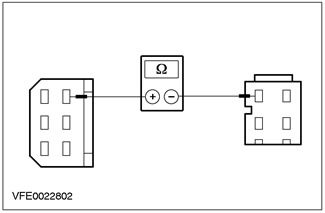
|
1 Measure the resistance between pin 3 of connector C470 of the heater fan variable resistor, circuit 31S-FA30 (black and white), on the wiring harness side, and pin 3 of connector C469 of the heater blower switch, circuit 31S-FA30 (black and white), from the wiring harness side. |
|
• Is less than 2 ohms registered? |
|
|
→ Yes |
|
|
REPLACE heater fan variable resistor. CHECK the system is working properly. |
|
|
→ No |
|
|
LOCATE and REPAIR open circuit 31S-FA30 (black and yellow) between the heater fan motor variable resistor and the heater fan switch, using the wiring diagrams. CHECK the system is working properly. |
|
|
B18: HEATER FAN SWITCH CHECK |
|
|
1 Enter the OFF position. |
|
|
2 Disconnect the C469 heater blower switch. |
|
|
3 Drive the ON position. |
|
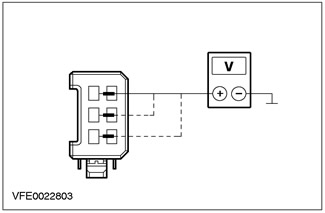
|
4 Measure the voltage between pin 5 of connector C469, heater blower switch, circuit 31S-FA32 (black and blue), from the wiring harness side, and ground. |
|
5 Measure the voltage between pin 3 of connector C469, heater blower switch, circuit 31S-FA31 (black and yellow), from the wiring harness side, and ground. |
|
|
6 Measure the voltage between pin 1 of connector C469, heater blower switch, circuit 31S-FA30 (black and white), from the wiring harness side, and ground. |
|
|
• Is battery voltage recorded for all measurements? |
|
|
→ Yes |
|
|
REPLACE heater blower switch. CHECK the system is working properly. |
|
|
→ No |
|
|
Go to B19 |
|
|
B19: CHECK THE ELECTRICAL CIRCUIT BETWEEN THE HEATER FAN MOTOR AND THE HEATER FAN VARIABLE RESISTOR. |
|
|
1 Enter the OFF position. |
|
|
2 Disconnect the heater fan variable resistor C470. |
|
|
3 Drive the ON position. |
|
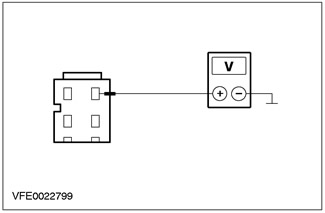
|
4 Measure the voltage between pin 1 of connector C470 of the heater fan variable resistor, circuit 31S-FA1 (black and blue) (from 08.2000 electric circuit 31S-FA33 (black-orange)), from the wiring harness side, and ground. |
|
• Is battery voltage being recorded? |
|
|
→ Yes |
|
|
Go to B20 |
|
|
→ No |
|
|
LOCATE and REPAIR the open circuit between solder joint S24 and heater fan variable resistor using the wiring diagrams. CHECK the system is working properly. |
|
|
B20: INSPECT ELECTRICAL CIRCUIT BETWEEN HEATER FAN VARIABLE RESISTOR AND HEATER FAN SWITCH |
|
|
1 Enter the OFF position. |
|
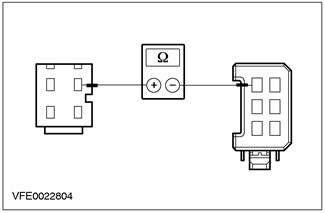
|
2 Measure the resistance between pin 4 of connector C470 of the heater fan variable resistor, circuit 31S-FA32 (black and blue), on the wiring harness side, and pin 5 of connector C469 of the heater blower switch, circuit 31S-FA32 (black and blue), from the wiring harness side. |
|
• Is less than 2 ohms registered? |
|
|
→ Yes |
|
|
Go to B21 |
|
|
→ No |
|
|
LOCATE and REPAIR open circuit 31S-FA32 (black and blue) between the heater fan motor variable resistor and the heater fan switch, using the wiring diagrams. CHECK the system is working properly. |
|
|
B21: INSPECT ELECTRICAL CIRCUIT BETWEEN HEATER FAN VARIABLE RESISTOR AND HEATER FAN SWITCH |
|
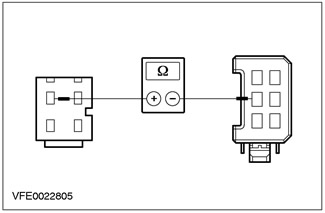
|
1 Measure the resistance between pin 3 of connector C470 of the heater fan variable resistor, circuit 31S-FA31 (black and yellow), on the wiring harness side, and pin 2 of connector C469 of the heater fan switch, circuit 31S-FA31 (black and yellow), from the wiring harness side. |
|
• Is less than 2 ohms registered? |
|
|
→ Yes |
|
|
Move to B22 |
|
|
→ No |
|
|
LOCATE and REPAIR open circuit 31S-FA31 (black and yellow) between the heater fan motor variable resistor and the heater fan switch, using the wiring diagrams. CHECK the system is working properly. |
|
|
B22: INSPECT ELECTRICAL CIRCUIT BETWEEN HEATER FAN VARIABLE RESISTOR AND HEATER FAN SWITCH |
|
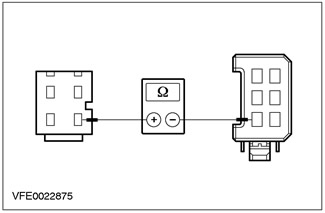
|
1 Measure the resistance between pin 1 of connector C470 of the heater fan variable resistor, circuit 31S-FA30 (black and white), on the wiring harness side, and pin 3 of connector C469 of the heater blower switch, circuit 31S-FA30 (black and white), from the wiring harness side. |
|
• Is less than 2 ohms registered? |
|
|
→ Yes |
|
|
REPLACE heater fan variable resistor. CHECK the system is working properly. |
|
|
→ No |
|
|
LOCATE and REPAIR open circuit 31S-FA30 (black and yellow) between the heater fan motor variable resistor and the heater fan switch, using the wiring diagrams. CHECK the system is working properly. |
|
PINPOINT TEST C: FAN MOTOR IS RUNNING CONTINUOUSLY
|
STATES |
DETAILS/RESULTS/ACTIONS |
|
C1: HEATER FAN SWITCH TEST |
|
|
1 Enter the OFF position. |
|
|
2 Disconnect the C469 heater blower switch. |
|
|
3 Drive the ON position. |
|
|
4 Check the operation of the heater electric fan. |
|
|
• Is the heater blower motor running continuously? |
|
|
→ Yes |
|
|
Go to C2 |
|
|
→ No |
|
|
REPLACE heater blower switch. CHECK the system is working properly. |
|
|
C2: CHECK THE ELECTRICAL CIRCUIT (CIRCUIT) TO HEATER FAN VARIABLE RESISTOR |
|
|
1 Enter the OFF position. |
|
|
2 Disconnect the heater fan variable resistor C470. |
|
|
3 Drive the ON position. |
|
|
4 Check the operation of the heater electric fan. |
|
|
• Is the heater blower motor running continuously? |
|
|
→ Yes |
|
|
CHECK for a short to ground on all circuits connected to solder point S24 using the wiring diagrams and REPAIR. CHECK the system is working properly. |
|
|
→ No |
|
|
CHECK for a short to ground on all circuits between the heater fan variable resistor and the heater fan switch using the wiring diagrams and REPAIR. CHECK the system is working properly. |
|
PINPOINT TEST D: AIR RECIRCULATION DAMPER MALFUNCTION
|
STATES |
DETAILS/RESULTS/ACTIONS |
|
D1: MODEL VARIANT DEFINITION |
|
|
1 Define the model variant. |
|
|
• Vehicle manufactured before 05.99? |
|
|
→ Yes |
|
|
Go to D2 |
|
|
→ No |
|
|
Go to D8 |
|
|
D2: GROUND CIRCUIT CHECK OF AIR RECIRCULATION DAMPER POSITIONING MOTOR |
|
|
1 Enter the OFF position. |
|
|
2 Disconnect the C375 air recirculation damper position motor. |
|
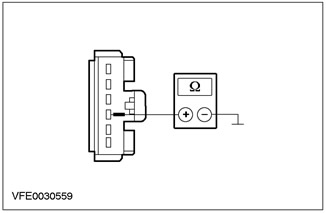
|
3 Measure the resistance between connector C375 pin 4 of the air recirculation damper position motor, harness side, and ground. |
|
• Is less than 2 ohms registered? |
|
|
→ Yes |
|
|
Go to D3 |
|
|
→ No |
|
|
LOCATE and REPAIR the open circuit between the air recirculation damper position motor and ground point G41 using the wiring diagrams. CHECK the system is working properly. |
|
|
D3: CHECK THE ELECTRICAL CIRCUIT BETWEEN THE HEATER CONTROL MODULE AND THE AIR RECIRCULATION DAMPER POSITIONING MOTOR |
|
|
1 Disconnect the C380 heater control module. |
|
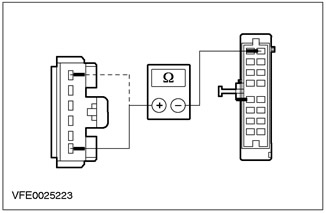
|
2 Measure the resistance between pin 16 of connector C380 of the heater control module, circuit 33-FA76 (yellow-blue), on the wiring harness side, and pin 1 of connector C375 of the air recirculation damper position motor, circuit 33-FA76 (yellow-blue) (right hand drive: pin 6, electrical circuit 32-FA76 (white-blue)), from the wiring harness side. |
|
• Is less than 2 ohms registered? |
|
|
→ Yes |
|
|
Go to D4 |
|
|
→ No |
|
|
LOCATE and REPAIR open circuit 33-FA76 (yellow-blue) or electric circuit 32-FA76 (white-blue) between the heater control module and the air recirculation damper positioning motor using the wiring diagrams. CHECK the system is working properly. |
|
|
D4: CHECKING THE ELECTRICAL CIRCUIT BETWEEN THE HEATER CONTROL MODULE AND THE AIR RECIRCULATION DAMPER POSITIONING MOTOR |
|
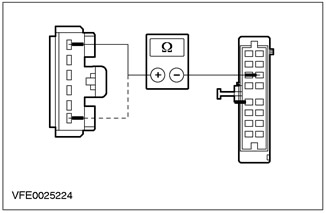
|
1 Measure the resistance between pin 14 of connector C380 of the heater control module, circuit 32-FA76 (white-blue), on the wiring harness side, and pin 6 of connector C375 of the air recirculation damper position motor, circuit 32-FA76 (white-blue) (right-hand drive vehicle: pin 1, electrical circuit 33-FA76 (yellow-blue)), from the wiring harness side. |
|
• Is less than 2 ohms registered? |
|
|
→ Yes |
|
|
Go to D5 |
|
|
→ No |
|
|
LOCATE and REPAIR open circuit 32-FA76 (white-blue) or electrical circuit 33-FA76 (yellow-blue) between the heater control module and the air recirculation damper positioning motor using the wiring diagrams. CHECK the system is working properly. |
|
|
D5: CHECKING THE ELECTRICAL CIRCUIT BETWEEN THE AIR RECIRCULATION FLAP POSITIONING MOTOR AND THE HEATER CONTROL MODULE |
|
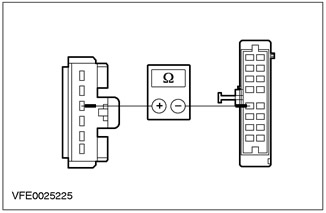
|
1 Measure the resistance between pin 4 of connector C380 of the heater control module, circuit 91S-FA90 (black and green), on the wiring harness side, and pin 3 of connector C375 of the air recirculation damper position motor, circuit 91S-FA90 (black and green), from the wiring harness side. |
|
• Is less than 2 ohms registered? |
|
|
→ Yes |
|
|
Go to D6 |
|
|
→ No |
|
|
FIND and REPAIR open circuit 91S-FA90 (black and green) between the heater control module and the air recirculation damper positioning motor using the wiring diagrams. CHECK the system is working properly. |
|
|
D6: HEATER CONTROL MODULE CHECK |
|
|
NOTE: If the air distribution control switch is set to the defogger/anti-frost position, the air recirculation mode cannot be activated. |
|
|
1 Connect the C380 heater control module. |
|
|
2 Drive the ON position. |
|
|
3 Turn on air recirculation. |
|
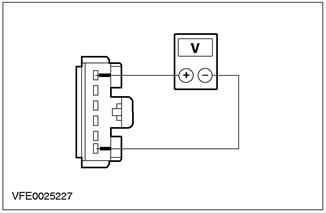
|
4 Measure the voltage between pins 1 and 6 of connector C375 of the air recirculation damper position motor, harness side. |
|
• Is a voltage of at least 10 V detected? |
|
|
→ Yes |
|
|
Go to D7 |
|
|
→ No |
|
|
CHECK if necessary REPLACE the heater control module. CHECK the system is working properly. |
|
|
D7: HEATER CONTROL MODULE CHECK |
|
|
1 Turn off air recirculation. |
|
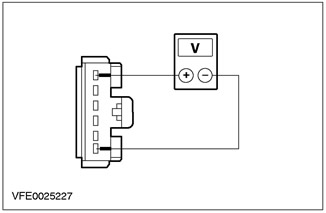
|
2 Again measure the voltage between pins 1 and 6 of connector C375 of the air recirculation damper position motor, harness side. |
|
• Has the voltage polarity changed? |
|
|
→ Yes |
|
|
CHECK the freedom of movement of the air recirculation damper. If the air recirculation damper is mechanically OK, REPLACE the air recirculation damper positioning motor. CHECK the system is working properly. |
|
|
→ No |
|
|
CHECK and if necessary REPLACE the heater control module. CHECK the system is working properly. |
|
|
D8: GROUND CIRCUIT CHECK OF AIR RECIRCULATION DAMPER POSITIONING MOTOR |
|
|
1 Enter the OFF position. |
|
|
2 Disconnect the C375 air recirculation damper position motor. |
|
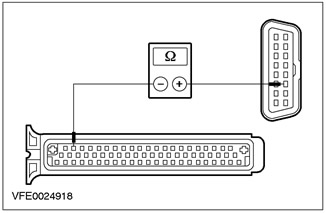
|
3 Measure the resistance between connector C375 pin 3 of the air recirculation damper positioning motor, harness side, and ground. |
|
• Is less than 2 ohms registered? |
|
|
→ Yes |
|
|
Go to D9 |
|
|
→ No |
|
|
LOCATE and REPAIR the open circuit between the air recirculation damper position motor and ground point G41 using the wiring diagrams. CHECK the system is working properly. |
|
|
D9: CHECK THE ELECTRICAL CIRCUIT BETWEEN THE HEATER CONTROL MODULE AND THE AIR RECIRCULATION DAMPER POSITIONING MOTOR |
|
|
1 Disconnect the C380 heater control module. |
|
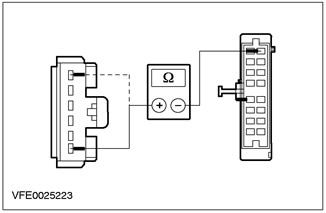
|
2 Measure the resistance between pin 16 of connector C380 of the heater control module, circuit 33-FA76 (yellow-blue), on the wiring harness side, and pin 6 of connector C375 of the air recirculation damper position motor, circuit 33-FA76 (yellow-blue) (right-hand drive vehicle: pin 1, electrical circuit 32-FA76 (white-blue)), from the wiring harness side. |
|
• Is less than 2 ohms registered? |
|
|
→ Yes |
|
|
Go to D10 |
|
|
→ No |
|
|
LOCATE and REPAIR open circuit 33-FA76 (yellow-blue) or electric circuit 32-FA76 (white-blue) between the heater control module and the air recirculation damper positioning motor using the wiring diagrams. CHECK the system is working properly. |
|
|
D10: CHECKING THE ELECTRICAL CIRCUIT BETWEEN THE HEATER CONTROL MODULE AND THE AIR RECIRCULATION DAMPER POSITIONING MOTOR |
|
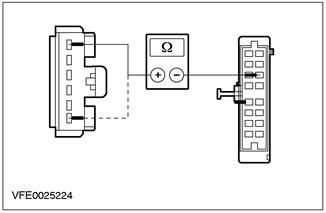
|
1 Measure the resistance between pin 14 of connector C380 of the heater control module, circuit 32-FA76 (white-blue), on the wiring harness side, and pin 1 of connector C375 of the air recirculation damper position motor, circuit 32-FA76 (white-blue) (right-hand drive vehicle: pin 6, electrical circuit 33-FA76 (yellow-blue)), from the wiring harness side. |
|
• Is less than 2 ohms registered? |
|
|
→ Yes |
|
|
Go to D11 |
|
|
→ No |
|
|
LOCATE and REPAIR open circuit 32-FA76 (white-blue) or electrical circuit 33-FA76 (yellow-blue) between the heater control module and the air recirculation damper positioning motor using the wiring diagrams. CHECK the system is working properly. |
|
|
D11: CHECKING THE ELECTRICAL CIRCUIT BETWEEN THE AIR RECIRCULATION FLAP POSITIONING MOTOR AND THE HEATER CONTROL MODULE |
|
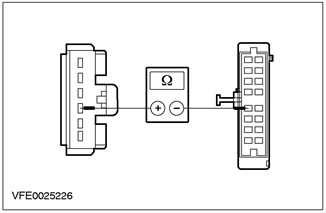
|
1 Measure the resistance between pin 4 of connector C375 of the air recirculation damper position motor, circuit 91S-FA90 (black and green), on the wiring harness side, and pin 4 of connector C380 of the heater control module, circuit 91S-FA90 (black and green), from the wiring harness side. |
|
• Is less than 2 ohms registered? |
|
|
→ Yes |
|
|
Go to D12 |
|
|
→ No |
|
|
FIND and REPAIR open circuit 91S-FA90 (black and green) between the heater control module and the air recirculation damper positioning motor using the wiring diagrams. CHECK the system is working properly. |
|
|
D12: HEATER CONTROL MODULE CHECK |
|
|
NOTE: If the air distribution control switch is set to the defogger/anti-frost position, the air recirculation mode cannot be activated. |
|
|
1 Connect the C380 heater control module. |
|
|
2 Drive the ON position. |
|
|
3 Turn on air recirculation. |
|
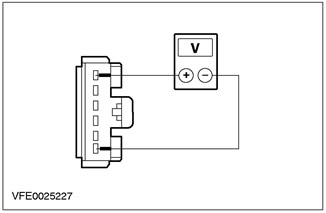
|
4 Measure the voltage between pins 1 and 6 of connector C375 of the air recirculation damper position motor, harness side. |
|
• Is a voltage of at least 10 V detected? |
|
|
→ Yes |
|
|
Go to D13 |
|
|
→ No |
|
|
CHECK and if necessary REPLACE the heater control module. CHECK the system is working properly. |
|
|
D13: HEATER CONTROL MODULE CHECK |
|
|
1 Turn off air recirculation. |
|

|
2 Again measure the voltage between pins 1 and 6 of connector C375 of the air recirculation damper position motor, harness side. |
|
• Has the voltage polarity changed? |
|
|
→ Yes |
|
|
CHECK the freedom of movement of the air recirculation damper. If the air recirculation damper is mechanically OK, REPLACE the air recirculation damper positioning motor. CHECK the system is working properly. |
|
|
→ No |
|
|
CHECK and if necessary REPLACE the heater control module. CHECK the system is working properly. |
|
Item checks
Relay for turning off the air conditioning system at wide open throttle (WOT).
1. Check the normally open contact in a non-switching state.
- Measure the resistance between pins 3 and 5 of the relay, element side.
- Is the registered resistance greater than 10 kΩ? If yes, go to step 2. If not, replace the relay.
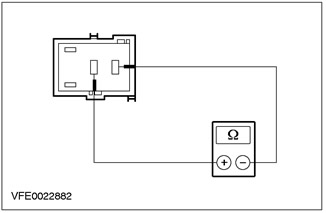
2. Check the normally open contact in the switching state.
- Using a fused test lead (1 A), connect relay pin 1, cell side, to battery positive.
- Using a test lead, connect relay pin 2, cell side, to the negative battery terminal.
- Measure the resistance between pins 3 and 5 of the relay, element side.
- Is resistance less than 2 ohms registered? If so, the relay is OK. If not, REPLACE the relay.
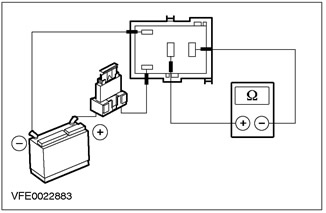
Visitor comments